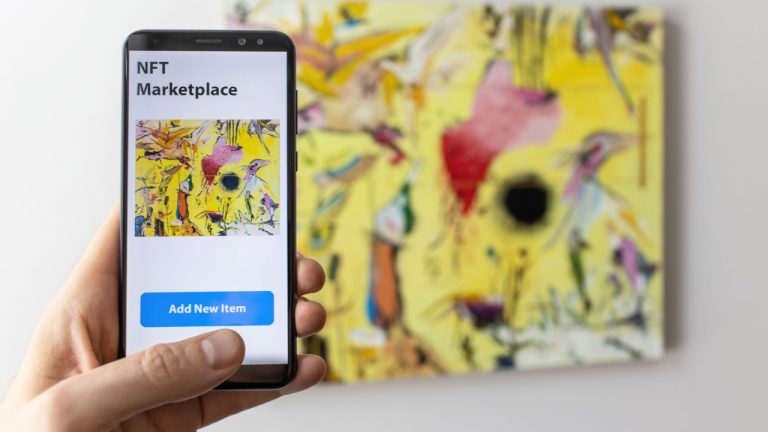
A gaming blockchain built over Ethereum (ETH) is joining forces with a crypto conversion service to streamline how traders purchase non-fungible tokens (NFTs) and digital assets. According to a new press release, play-to-earn gaming platform Ronin (RON) is inking a partnership with Transak, a platform that lets investors purchase NFTs and the ecosystem’s tokens using […]
The post Ethereum (ETH)-Based Gaming Blockchain Ronin (RON) Inks Partnership To Simplify NFT and Crypto Purchases appeared first on The Daily Hodl.

An investigation into the victim of an NFT scam led the Brooklyn District Attorney’s Virtual Currency Unit to discover and dismantle a network of fake NFT marketplace sites.
Brooklyn’s District Attorney said his office has shut down 40 fraudulent non-fungible token (NFT) marketplace websites after an 85-year-old artist was conned out of $135,000 by a scammer.
The victim was contacted on LinkedIn by someone posing as an art dealer who convinced him to mint his artwork on a fake NFT marketplace resembling the New York-based OpenSea, the Brooklyn District Attorney’s Office said on Dec. 6.
He was later told he made $300,000 in profits — but in order to access it, he had to send a $135,000 “fee,” which he sourced from fully liquidating his retirement account, credit card payments and a loan.

Ripple's chief legal officer Stuart Alderoty says the term is “fabricated” with no legal basis.
Ripple Labs' chief legal officer has taken aim at the United States Securities and Exchange Commission (SEC) repeated use of the phrase "crypto asset security", arguing its a fabricated term with no legal grounding.
In a recent Aug. 30 filing, the SEC warned it could challenge any plan by defunct crypto exchange FTX to use stablecoins in repaying creditors, with the regulator noting its portfolio has "crypto asset securities."
Ripple's top lawyer, Stuart Alderoty, argues the SEC is trying to “deceive judges” by using the term.
 Starbucks has said it will discontinue its Odyssey non-fungible token beta program and members “have until March 25, 2024, to complete any remaining journeys.” Starbucks stated on its FAQ page that it will keep its NFT community in mind and is working to find a place for its members to connect in the future. Starbucks […]
Starbucks has said it will discontinue its Odyssey non-fungible token beta program and members “have until March 25, 2024, to complete any remaining journeys.” Starbucks stated on its FAQ page that it will keep its NFT community in mind and is working to find a place for its members to connect in the future. Starbucks […]
A non-fungible token (NFT) marketplace is surging after being listed by the largest crypto exchange platform by volume in the world. In a new announcement, crypto exchange Binance says it is listing BLUR, the governance token of Altcoin Blur, a decentralized NFT marketplace that offers real-time price streams and comparisons. According to Binance, BLUR will […]
The post NFT Marketplace Altcoin Blur Leaps After Listing on Top Crypto Exchange by Trading Volume Binance appeared first on The Daily Hodl.

The NFT artists were also ordered to cover Yuga Labs’ legal fees after determining the trademark infringement constituted an “exceptional case.”
A United States district court judge has ordered nonfungible token (NFT) artists Ryder Ripps and Jeremy Cahen to pay Bored Ape Yacht Club creator Yuga Labs a total of $1.57 million in disgorgement and damages, along with legal fees, bringing an end to the long-running “copycat” NFT lawsuit.
The Oct. 25 order follows an April 21 partial summary judgement granted in favor of Yuga Labs after the firm claimed that Ripps and Cahen, the defendants, violated copyright laws by making copycat versions of its Bored Ape Yacht Club (BAYC) collectibles.
District court Judge John Walter awarded Yuga Labs $1.37 million after concluding the NFT firm was entitled to a disgorgement of the defendants’ profits. An additional $200,000 was awarded in statutory damages relating to cybersquatting violations.
Yuga Labs v. Ryder Ripps et al - Notes from the Court's Findings of Fact and Conclusions of Law
— NeerMcD.eth (@NeerMcD) October 26, 2023
Yuga is awarded $1,375,362.92 in Ds profits, $200,000 in statutory damages, and attorneys' fees and costs (amount TBD). A permanent injunction is also issued against Ds.
1/ pic.twitter.com/2dTiuWpZSA
Yuga Labs has also been entitled to recover attorney fees and costs from the NFT artists after the judge determined the trademark infringement constituted an “exceptional case.”
“A trademark case is generally considered exceptional for purposes of awarding of attorneys’ fees when a party has taken positions that can be characterized as “malicious, fraudulent, deliberate or willful,” the judge noted.
Judge Walter also knocked back the defendants’ argument that the copycat BAYC versions were “satire” and “parody” — ruling that the defendants intentionally infringed Yuga’s BAYC trademarks with a bad faith intent to profit from them.
He also noted the defendants continued to market and promote their copycat BAYC versions after the partial summary judgement was delivered against them in April.
Yuga Labs filed the lawsuit against the two artists in June 2022.
In an Oct. 16 hearing in a United States appeals court, Ripps and Cahen’s lawyers tried to argue the lawsuit should be thrown out on the grounds of free speech under California’s anti-SLAPP statute. However, the three-judge panel didn’t appear persuaded by the lawyer’s arguments.
Related: NFTs aren’t dead — they’re just resting
BAYC is one of the most valuable NFT collectibles on NFT marketplace OpenSea.

Since April 2021, it has amassed 1.32 million Ether (ETH) or $2.38 billion in trading volume with an average floor price of 27.4 ETH ($49,200), according to OpenSea.
Magazine: Digital artist OSF gives fans a pledge of ‘art until I die’: NFT Creator

Before it was taken down, Ordswap users said the compromised website directed users to a phishing link.
Ordswap, a marketplace that allows users to inscribe, auction, and trade Bitcoin Ordinals, has devised a method for users to retrieve their private keys as it scrambles to regain control of its website domain.
In an Oct. 10 X (Twitter) post, the Ordswap X account shared an online tool that purports to help users who logged into the site through MetaMask to recover their Ordswap private keys, allowing them to move to other providers.
Source for metamask users to obtain key is now available below. You are able to import(hex) to Unisat. https://t.co/oETb7h7sA0 https://t.co/NGaaLiNNwW
— Ordswap (@ordswap) October 10, 2023
Hours earlier, on Oct. 9, Ordswap posted a stark warning to users not to connect to its domain as it was not in control of it. It pinned the issue on Netlify — a website development and hosting firm.
We are working on publishing source for metamask users to obtain their key if they have not already. The issue appears to be with Netlify, but we are still working through it. https://t.co/uYGxJkzGfj
— Ordswap (@ordswap) October 9, 2023
On the project’s Discord server, a member of Ordswap’s team and users reported that for a time, the website featured a button prompting users to connect their crypto wallet in an apparent attempt to phish users.
One X user reported the button was a wallet drainer — an increasingly popular tool deployed by crypto scammers. At the time of writing, Ordswap’s website automatically redirected to a competing marketplace RelayX.
An Ordswap team member on Discord claimed the project had not seen an impact on user private keys or assets due to the breach but added users could be compromised if they interacted with the site.

Related: FTX hacker could be using SBF trial as a smokescreen: CertiK
In late September, the website for the Ethereum-based automated market maker Balancer was compromised in a seemingly similar attack, with attackers making off with around $240,000 worth of funds.
Balancer later said it believed the exploiters undertook a social engineering attack on its DNS service provider EuroDNS which allowed attackers to input a prompt to trick users into approving a malicious contract that drains their wallet.
Magazine: NFT Collector: Giant Swan’s gothic VR dreamscapes… royalty nightmare on OpenSea

OpenSea’s royalty enforcement tool Operator Filter is going to be turned off, according to the NFT marketplace’s founder and CEO, Devin Finzer.
Nonfungible token (NFT) marketplace OpenSea is sunsetting its on-chain royalty enforcement tool — Operator Filter — that allows creators to blacklist NFT marketplaces that don’t enforce royalties.
The change is set to take effect on Aug. 31, according to an Aug. 17 statement by OpenSea founder and CEO Devin Finzer.
The Operator Filter feature was first introduced in November 2022 and was described as a “simple code snippet” that could restrict NFT sales to only marketplaces that enforced creator fees.
Starting Aug 31, we’ll:
— OpenSea (@opensea) August 17, 2023
- Sunset the OpenSea Operator Filter
- Move to optional creator fees on all secondary sales for new collections
- Improve visibility of creator fee settings and listings on buyer & seller side
More below:
However, Finzer said that the tool hadn’t had the success they had hoped, as it didn’t have the needed support from the NFT ecosystem.
Finzer claimed that NFT marketplaces such as Blur, Dew and LooksRare had circumvented the Operator Filter by integrating the Seaport Protocol to bypass OpenSea’s blacklist and therefore avoid creator fees.
Finzer said they also saw pushback from creators, who saw the tool as encroaching on their control over where their collections were sold.
“We have heard from some creators that the Operator Filter limits their sense of control over where their collections are sold, and at the same time may collide with a collector’s expectation of full ownership.”
“The Operator Filter’s restrictions come at the expense of decentralized ownership,” he added.
Finally, Finzer explained that while creator fees are useful for certain business models, its only one of many revenue streams available to creators and there are a number of other use cases of NFT technology that need to be considered.
We’ve had a few learnings since launching our Operator Filter:
— OpenSea (@opensea) August 17, 2023
- It relied on opt-in from the entire ecosystem, which didn’t happen
- Creator fees choice is important for collectors and creators
- Creator fees are just one of many revenue streams available to creators in web3
“We’ve dedicated a large part of our roadmap to power new use cases — starting with digital and physical redeemables — and to merchandise those use cases more effectively across primary and secondary experiences,” he said.
Related: Reddit prepares to drop Gen 4 collectible avatars on Polygon
Starting from Aug. 31, the Operator Filter will no longer block any marketplaces. However, any collections that are using the tool and for existing collections on non-Ethereum blockchains, the creator’s preferred fees will be forced up to Feb. 29, 2024.
“To be clear, creator fees aren’t going away — simply the ineffective, unilateral enforcement of them,” Finzer added.
The move is considered by some to be a potential blow for NFT artists looking to make passive income.
Several members of the NFT community expressed disappointment toward OpenSea’s decision, stating on Aug. 17 that collectors should support NFT creators on platforms that mandate royalties:
Opensea is caving into pressure from its competitors to kill royalties.
— ROCKΞT (@RocketEGC) August 17, 2023
As members of nft communities the best way to impact this royalty problem and support your project is to only use platforms that will support your communities and honor their royalties.
Stop supporting…
However, a Reddit avatar artist believes it may have been the right move, suggesting the business model aimed to profit too much off of hype trading.
Magazine: NFT Collector: Grails’ lucky dip of famous NFT artists, new hope for PFP holders

Orica NFT’s charity efforts have succeeded, but its tokenholders have not, and up until now, its co-founder was nowhere to be found.
Launched in November 2021, nonfungible token (NFT) marketplace Orica held itself up as an “ethical platform” benefitting artists, collectors and charities alike. At the time, the organization was involved in prominent projects — from building a school in Uganda to aiding victims of human trafficking to helping Ukraine.
But less than two years later, the project’s founders have disappeared, and the marketplace’s user interface has gone offline. All that remains are the project’s charity efforts, which proved to be genuine, in tandem with allegations from disgruntled users that the developers orchestrated a rug pull. In a new revelation, co-founder Danial Zey breaks his yearlong silence, not only denying all allegations and insisting the project was “hacked” but also claiming that the project is still ongoing. Cointelegraph investigates.
According to initial coin offering (ICO) information site CryptoTotem, Orica ran a fundraiser from Aug. 14 to Sept. 14, 2021. It aimed to raise $3.1 million from the sale of its Orica (ORI) token. In its ICO, Orica promised to earmark 50% of the total supply of ORI for “NFT marketplace rewards.” Another 10% was supposed to be supplied to “advisors and partners,” 15% given to the team and 25% sold to investors. At launch, Aug. 21, 2021, the price of ORI rose to a peak of $3.638 per coin, then fell to $0.036 by Oct. 1, 2022, based on data from Live Coin Watch.
The token no longer has tangible value at the time of publication, and its communication channels appear to have gone cold. A former user, who wished to remain anonymous, told Cointelegraph that the “[NFT] marketplace kind of dried out with not enough people using it and then very quickly everything went kind of offline including their website."

In late 2021, the firm partnered with Austrian charity project Bbanga to help build a school for children in the Ssese Islands in Uganda. Bbanga commissioned German digital artist Mellowmann to release Uganda-inspired digital art pieces as NFTs, which were then to be sold via Orica’s marketplace. The sale surpassed the $6,500 goal needed to construct the school.

A former Orica staff member, who wished to remain anonymous, told Cointelegraph that “the Uganda school received full payment as this was overseen by Sani, Founder of the Bbanga Project, who was working with Orica at the time." The project released a video this June showcasing that some of the school's buildings had already been built, including a main hall and library.

On Dec. 21, 2021, charity group Hope for the Future also announced that it would be selling NFTs on Orica to fund its efforts. Hope for the Future is another Austrian-based nonprofit that helps victims of human trafficking reintegrate into society after they are rescued from captivity. The charity continues to operate today. Its efforts to help Ukrainian artists also materialized in the REFUGE campaign that ran in March 2022.

When prompted on the matter, the former Orica staff member said, “All artists were paid in full." An amount close to $30,000 was raised in conjunction with Orica’s efforts to help Ukraine and was processed by crypto donations processor The Giving Block. In one of the last statements before going cold, Zey wrote: “We donated 10% of the amount we ever made. Our main product is tech that is built to give to people."
Despite official claims as to why the project went down, blockchain data and user complaints suggest irregularities.
On May 11, 2022, the Polygon version of Orica was deployed as part of its migration from BNB Smart Chain. This version had a total supply of just 84 million tokens, 16 million less than the original Orica token on BNB Chain. The Polygon version of ORI was a “liquidity generator” token with built-in liquidity provider and swap functions. It had the ability to call contracts on the decentralized exchange QuickSwap, which is a fork of Uniswap v2 on Polygon.
On June 4, 2022, an Orica Discord server admin who goes by the name “Plem” told users the migration was complete. According to Plem, users had received tokens on the new chain equal to the ones they held on the previous chain.

Some users complained that they had not received their tokens. In response, the admin told them to add the new token contract in MetaMask. If they did this and still did not see their tokens, they were asked to submit a support ticket.
But the deployer on Polygon did not directly send tokens to users who held ORI on BNB. Instead, it transferred ownership to a separate account, which proceeded to sell nearly the entire supply of the coin through market-making operations. Zey stated that this second account was not operated by him. Instead, he claimed that a “hacker” stole his deployer key and transferred it. The new owner proceeded to call various liquidity provider and swap functions over the next two months on QuickSwap.
Zey did not report this attack until Aug. 11, 2022, exactly one month after it had occurred. A member of the team had reported 24 days after the “attack” that the migration had been completed. The same day, the new owner transferred an unusually large amount of tokens — 23,187,983 — to address 0x14dd44e1d3f9a173998c53d75622127ce921ccee. After this transaction, the new owner continued to post liquidity provider transactions for ORI tokens until the new owner stopped on Sept. 11, 2022. In a similar Aug. 11, 2022 Telegram message, Zey claimed that his laptop had been hacked and that tokens had been “moved out directly from the deployer.”
On Aug. 12, 2022, Plem announced that the project would be “closing communications” due to a “hard situation that involves massive uncontrollable tokens deployment and selling process.”

In the final message, users were told to send direct messages to Zey if they had questions, referring to the team’s blockchain operations lead. Subsequent messages to the group indicate that Zey has blocked all messages.


Related: Newly discovered Bitcoin wallet loophole let hackers steal $900K — SlowMist
On Sept. 11, 2022, the new owner made a final transfer of approximately 150 Polygon (MATIC), worth $133.10 at the time, to address 0xfE3fB1d3C9FBF50b6af3A60b5D070dF68D87b99e. This account had previously received 3,463 MATIC ($3,082 at the time) from the new owner. At the time of publication, 9.9 million ORI ($4,341 at today’s price) remains in the account that was transferred ownership after deployment.
Speaking to Cointelegraph on Aug. 17, 2023, Zey denied the rug pull allegations, stating:
“I think the situation is complex and it is not wise to give out info that we might need to win some of the funds back. About the part with rug pull. We had a team of more than 15 people and we paid them until the end salaries plus we paid for the liquidity , Certik audit and some parts of the development."
“Our tokens were locked," said Zey. “On the blockchain it is also provable that we had several severe attacks on us. We are a charity project but still got hacked," he stated while alleging that hacked funds were laundered through cryptocurrency mixer Tornado Cash, making it impossible to trace. “The few remaining people that worked without any salary like myself are still in this project working patiently behind the scenes but the comeback has to be strong so we can make up for the situation," Zey claims.
Zey did not respond to a request for the hash ID of transactions linked to the alleged Orica hack.
Out of 12 team members listed in the project’s ICO, five have deleted their LinkedIn profiles — Zey, legal counsel Ivan, process manager Karim, IT project manager Pouriya and business development manager Rilwan. The others, save for Zey, were either unreachable or had left Orica by the time of its breakdown.

As of today, most of what remains of Orica is in the brick and stone of a school in Uganda and the artists it has helped.
But also remaining are the tokenholders who never received a proper explanation as to why the project has ceased to exist. Despite breaking his silence, Zey never addressed the reasons for the hiatus, and many questions remain unanswered.
It’s not uncommon to see that investors and co-founders alike build rapport around a project as friends and exit as enemies during its collapse. But for Orica, there was at least a brief moment in which everything seemed to have worked well.
Cointelegraph editor Zhiyuan Sun contributed to this story.
Related: Crypto developer commits $2M rug pull fraud to fuel gambling addiction

Some pundits have argued the trader mistakenly put up a bid for 100 ETH which was quickly snapped up, while others believe the sale was a wash trade.
A nonfungible token (NFT) trader has seemingly fat-fingered a bid for a free NFT, buying it for 100 Ether (ETH), currently valued at $191,239, instead of nothing.
The token was part of NFT marketplace OpenSea’s Gemesis NFT collection — free NFTs intended to commemorate the launch of OpenSea Pro on April 4. The trader's bid is a 250,000% increase on the floor price of 0.04 ETH.
OpenSea Pro is a marketplace aggregator tailored to professional users by providing them with what OpenSea calls “a vastly improved” suite of features such as live cross-marketplace data and advanced orders.

While some have argued the sale was wash trading, Twitter user “0xSun” believed the sale — which occurred on the NFT marketplace Blur — happened because the trader wanted to bid $100 as an amount, but accidentally bid 100 ETH instead.
Yeah someone else put the 100ETH bid by mistake (He probably want to bid 100 as amount) and it got accepted by another one with 1500+ gwei gas
— 0xSun (@0xSunNFT) April 5, 2023
A Reddit user who posted about the sale also cast doubt on the wash trading theory, arguing it was an open offer that was available to anyone, making it too risky to be a wash trade as another trader or bot would quickly snap up an offer so far above the floor price.
“I know what you guys are thinking it was a wash trade but this was an open offer that could have been accepted by anybody, so it would be a pretty big risk hoping you were faster than anybody else looking at the offers at that moment.”
Wash trading is a form of market manipulation in which a trader buys and sells an asset to feed misleading information to the market. The practice is illegal in traditional stock markets but is very prevalent in NFT trading.
Related: NFTs in the event and ticketing industry: How can it sustain millions of users?
OpenSea acquired NFT aggregator Gem for an undisclosed amount on April 25, 2022, and refined the platform in order to create OpenSea Pro.
Only users who bought at least one NFT on Gem prior to March 31 are eligible to mint a Gemesis NFT, with the minting window set to close on May 4.
NFT Creator, Sarah Zucker: The Sarah Show’s analog past meets dizzying digital future